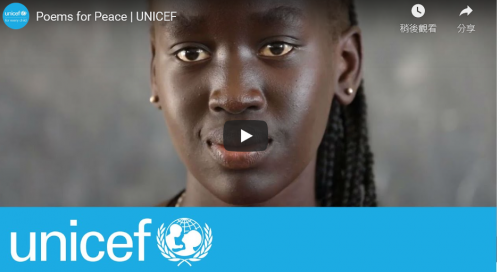World Poetry Day: Young people in war zones across the world share heart-wrenching poems calling for peace
As the world battles COVID-19, peace in countries affected by conflict is critical, warns UNICEF
Young people living through war and conflict around the world have shared powerful and emotive poems calling for peace in their home countries, in a new initiative launched on 21 March, 2020 by UNICEF.

Marking World Poetry Day the Poems for Peace initiative draws attention to the plight of the millions of children living in conflict zones worldwide, for whom peace has become a distant memory.
“The words of these young aspiring poets carry a resounding message. Children and young people living through the horrors of war have had enough,” said Paloma Escudero, UNICEF Director of Communication. “As the battle against COVID-19 continues, we need peace, kindness and solidarity more than ever.”
Poems for Peace provides a platform for children and young people affected by conflict to express themselves and have their voices heard. The initiative will continue to run to allow other children and young people affected by conflict to write and submit their poetry.
The Poems for Peace series features children and young people from conflict-affected countries including Afghanistan, the Democratic Republic of the Congo, Iraq, Mali, Somalia, South Sudan, Syria, Ukraine and Yemen reading their poems to camera. Using clips from the individual videos, UNICEF has created a short film creating one powerful poem out of all of those submitted.
The poem submitted by Rihana, a 17-year-old girl living in Afghanistan, reads:
What do they know of the desire for peace
Those who have spent a lifetime with peace
What do they know of the misery
Of losing a son or a loved one to war,
Look at this country, stained in blood
One tragedy not yet over, another is waiting
Everyday lifeless bodies go underground
How long before this bleak war will end.
World Poetry Day celebrates one of humanity’s most treasured forms of cultural and linguistic expression and identity. Poems have long been a catalyst for dialogue and peace and united people and cultures in a common humanity and shared values.
source: United Nations Children's Fund
- 635 reads
Human Rights
Fostering a More Humane World: The 28th Eurasian Economic Summi

Conscience, Hope, and Action: Keys to Global Peace and Sustainability

Ringing FOWPAL’s Peace Bell for the World:Nobel Peace Prize Laureates’ Visions and Actions

Protecting the World’s Cultural Diversity for a Sustainable Future

Puppet Show I International Friendship Day 2020

